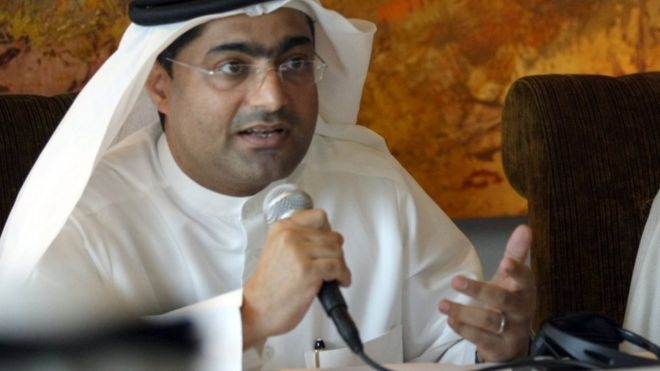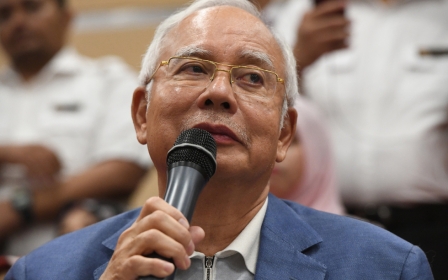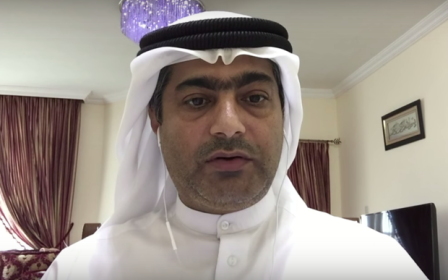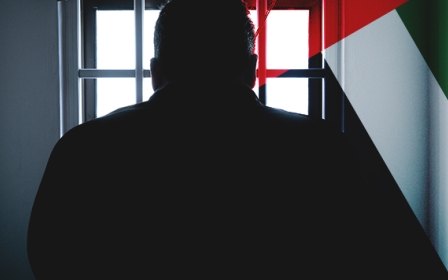Ten years for a tweet: UAE's shameful imprisonment of Ahmed Mansoor

Last week Abu Dhabi's Supreme Court sentenced the awarded-winning Emirati human rights activist Ahmed Mansoor to 10 years in prison after finding him guilty of using his social media account to "defame the nation" by spreading "rumours and lies about the UAE" and promoting "sectarian feelings and hatred" among its citizens.
It is a ruthless ruling for one of the region's most prominent rights campaigners, who in 2015 won the prestigious Martin Ennals Award for Human Rights Defenders after his tireless struggle for basic political and civil rights in the UAE.
The court also fined Mansoor 1m Dirhams (£204,000) and ordered him to be placed on close surveillance for a further three years following the completion of his sentence.
A year of silence
This news, which first broke in the local press, follows more than a year of silence from government-backed media outlets, where seemingly something of a state-sanctioned embargo has been in place since his arrest last year. During this period Amnesty International reported that Mansoor was being held in an unverified location, without charge or access to proper legal counsel. Yet, little else was known past this.
It is perhaps of little surprise that when news of Mansoor's conviction broke last Wednesday, it did so in a vague, confusing and eerily nonchalant manner. Gulf News, a UAE government-backed English daily based in Dubai, provided what seemed to be an accurate profile of Mansoor's case but refused to disclose the identity of the defendant in question, who they inconspicuously referred to as 'AMS'.
Amid a brutal post-Arab Spring crackdown in the UAE, Mansoor quickly became a lone voice speaking up for the silenced
It was almost as if the UAE wanted to get this news out in a way that created as little fanfare as possible. Many hours were to pass before the UAE state-owned publication the National confirmed that this was indeed Ahmed Mansoor; international media promptly picked up the story within minutes – no doubt to the ire of the UAE government.
Emirati authorities, however, are yet to give an official comment on the court decision. More pertinently, Mansoor's exact whereabouts remains unknown, leaving the 48-year-old father of four at grave risk of torture and other forms of ill-treatment.
A brutal crackdown
Despite pressure from UN bodies and rights groups to do so, the UAE have so far – in clear breach of international law – failed to disclose Mansoor's location. Earlier this year in a mission mandated by international NGOs including Front Line Defenders and the Martin Ennals Foundation, two Irish lawyers travelled to the UAE to track down Mansoor's whereabouts only to be given the runaround by officials, who provided them with misinformation and led them down blind alleys.
Yet amid all of this, one thing is crystal clear: Ahmed Mansoor is in prison because of his steadfast commitment to human rights, social justice and democracy.
Amid a brutal post-Arab Spring crackdown in the UAE - which has seen scores of government critics arbitrarily detained, forcefully disappeared and imprisoned for raising human rights issues and calling for reforms – Mansoor quickly became a lone voice speaking up for the silenced.
From his seat on the advisory boards of the Gulf Centre for Human Rights and Human Rights Watch, Ahmed would not only document, but publicly speak out about the manifold abuses taking place in the country.
Mansoor's sentence appears to be the final nail in the coffin for the UAE's short-lived pro-democracy movement
As a consequence he suffered years of harassment, intimidation and abuse from the regime and its supporters - sacrificing a comfortable life in the Emirates. Yet right until the end he carried on: the day before his arrest he issued a call for the release of Osama al-Najjar, an Emirati rights activist who has now been held for more than a year since the completion of his original sentence.
Perhaps, in his heart, Ahmed knew this day would come. But he always refused to place himself above the struggle, telling journalist Bill Law prior to his arrest: "The only way to counter repression is by revealing it. And, yes, there is always that possibility that I will go back to jail. But if activists do not talk, who will?"
The knock-on effect
Indeed, as the last dissident voice in the Emirates is silenced, it remains to be seen who is left to speak out about injustice in the UAE. Mansoor's sentence appears to be the final nail in the coffin for the UAE's short-lived pro-democracy movement, which emerged briefly as revolutionary upheaval swept across the region in 2011.
This conviction however unlike many others cannot so easily be swept under the carpet, as Sarah Leah Whitson, the Middle East director at Human Rights Watch, said: "So long as Mansoor remains in prison, no amount of money nor army of public relations firms will be able to wash away this stain on the UAE's reputation."
This knock-on effect has already begun. In the UK, pressure is now mounting on Manchester mayor Andy Burnham to issue a statement on Ahmed's case after a coalition of 34 NGOs, including Amnesty International and the European Centre for Democracy and Human Rights, demanded intervention.
This is a sensitive and fought over issue in a city whose council have burgeoning commercial links with the UAE, and whose football club is owned outright by the Emirates' deputy prime minister, Sheikh Mansoor bin Zayed al-Nahyan.
In what would be a PR nightmare for the UAE authorities, Amnesty International campaigners are now pushing to rename a street in the city after Ahmed Mansoor. Given Labour's shift to the left it is not inconceivable that Burnham, who up until now has been a Corbyn loyalist, will accept their demands.
UAE soft power under fire
Meanwhile, in north London, Arsenal supporters are now questioning their club's links with the UAE, which began with their move to the Emirates Stadium more than 10 years ago. In response to Ahmed's sentence, leading Arsenal fan website the Daily Cannon published an editorial calling for a review of the club's sponsorship deal with Emirates Airline.
Perhaps for the first time the UAE's soft-power project in the UK now lies on contested ground, not only from regional foes, but increasingly from ordinary people across Britain.
This was always the risk for the Emirati regime: locking up one the world's most prominent human rights defenders was liable to backfire on a PR level. There is simply no justification for Ahmed Mansoor’s sentence - and the UAE government know it.
In light of this, it is now crucial that sustained pressure is exerted on the UK government to raise Ahmed's case more fervently with the UAE authorities. Since his arrest over a year ago, the current administration has been far too reluctant to speak up for him - preferring instead to prioritise lucrative trade deals over human rights.
If the government are in any way serious about their commitment to the promotion of social justice abroad, they must issue a call for his immediate and unconditional release.
Joe Odell is press officer for the International Campaign for Freedom in the UAE. He has an MA in Middle East politics from the School of Oriental and African Studies.
The views expressed in this article belong to the author and do not necessarily reflect the editorial policy of Middle East Eye.
Photo: Ahmed Mansoor is a prominent dissident in the UAE and last year won the Martin Ennals Award (AFP)
New MEE newsletter: Jerusalem Dispatch
Sign up to get the latest insights and analysis on Israel-Palestine, alongside Turkey Unpacked and other MEE newsletters
Middle East Eye delivers independent and unrivalled coverage and analysis of the Middle East, North Africa and beyond. To learn more about republishing this content and the associated fees, please fill out this form. More about MEE can be found here.





